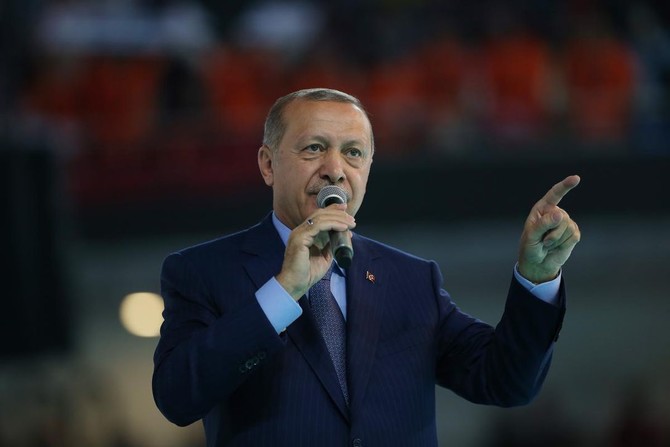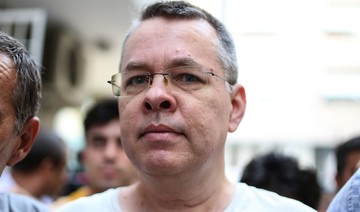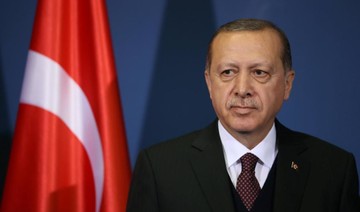ISTANBUL/ANKARA: President Tayyip Erdogan told Turks on Friday to exchange gold and dollars into lira as the country’s currency plunged as much as 19 percent on worries about his influence over monetary policy and worsening relations with the United States.
US President Donald Trump said he had authorized higher tariffs on imports from Turkey, imposing a 20 percent duty on aluminum and 50 percent one on steel.
Trump noted on Twitter that the lira “slides rapidly downward against our very strong Dollar!“
“Our relations with Turkey are not good at this time!” he said in an early morning post.
I have just authorized a doubling of Tariffs on Steel and Aluminum with respect to Turkey as their currency, the Turkish Lira, slides rapidly downward against our very strong Dollar! Aluminum will now be 20% and Steel 50%. Our relations with Turkey are not good at this time!
— Donald J. Trump (@realDonaldTrump) August 10, 2018
Waves from the crisis spread abroad, with investors selling off shares in European banks with large exposure to the Turkish economy.
New Finance Minister Berat Albayrak — Erdogan’s son-in-law — acknowledged that the central bank’s independence was critical for the economy, promising stronger budget discipline and a priority on structural reforms.
The lira sell-off has deepened concern about exposure to Turkey, particularly whether over-indebted companies will be able to pay back loans taken out in euros and dollars after years of overseas borrowing to fund a construction boom under Erdogan.
Erdogan’s characteristic defiance in the face of the crisis has further unnerved investors. The president, who says a shadowy “interest rate lobby” and Western credit ratings agencies are attempting to bring down Turkey’s economy, appealed to Turks’ patriotism.
“If there is anyone who has dollars or gold under their pillows, they should go exchange it for liras at our banks. This is a national, domestic battle,” he told a crowd in the northeastern city of Bayburt. “This will be my people’s response to those who have waged an economic war against us.”
The lira, which has lost a third of its value this year, fell on his comments and was trading at around 6.6 to the dollar after he spoke, nearly 9 percent weaker on the day. “The dollar cannot block our path. Don’t worry,” Erdogan assured the crowd.
That is unlikely to mollify investors who are also worried by a growing dispute with the United States. The NATO allies are at odds over the detention in Turkey of US evangelical pastor Andrew Brunson on terrorism charges.
TENSION WITH WASHINGTON
The tensions with Washington have, for investors, underscored Turkey’s authoritarian trajectory under Erdogan.
“The basic reason the exchange rate has gone off the rails is that confidence in the management of the economy has disappeared both domestically and abroad,” said Seyfettin Gursel, a prominent economist and a professor at Turkey’s Bahcesehir University.
“First of all, confidence needs to be regained. It is obvious how it will be done: since the final decision-maker of all policies in the new regime is the president, the responsibility of regaining confidence is on his shoulders.”
The lira briefly fell as much as 14.6 percent — its biggest one-day drop since early 2001 — before paring losses. Shares of European lenders also dropped, hit by concern about their Turkish exposure.
Turkey’s sovereign dollar-denominated bonds tumbled with many issues trading at record lows. Hard currency debt issued by Turkish banks suffered similar falls.
Meanwhile the cost of insuring exposure to Turkey’s sovereign debt through five year credit defaults swaps has spiralled to the highest level since March 2009, topping levels seen for serial defaulter Greece , which has three bailouts in the last decade.
DRASTIC
Presenting the government’s new economic model, Albayrak said the next steps of rebalancing would entail lowering the current account deficit and improving trust.
There would be a transformation in the finance ministry with regards to taxation, he said. His comments did nothing to shore up the lira currency. It fell yet further to 6.2 to the dollar at 1254 GMT, nearly 12 percent weaker on the day.
The currency has fallen more than 35 percent this year after losing nearly a quarter of its value in 2017. This week alone, it has lost about 15 percent. Such relentless depreciation drives up the cost of imported goods from fuel to food for ordinary Turks.
“The situation of Turkey cannot go on for much longer — I think they will have to intervene,” Cristian Maggio, head of emerging markets strategy at TD Securities, adding that the intervention needed to be “drastic.”
“Turkey is playing a very dangerous game. They keep lagging behind the curve and the pace of the depreciation and the penalty that the market inflicts on Turkey when it sells off is increasing at a more than linear pace, almost exponentially.”
Erdogan, a self-described “enemy of interest rates,” wants cheap credit from banks to fuel growth, but investors fear the economy is overheating and could be set for a hard landing. His comments on interest rates — and his recent appointment of his son-in-law as finance minister — have heightened perceptions that the central bank is not independent.
The central bank raised interest rates to support the lira in an emergency move in May, but it did not tighten at its last meeting.
NO BREAKTHROUGH
While Turkey and the United States disagree over a host of issues, the most pressing disagreement has been over Brunson and the detention of other US citizens in Turkey. A delegation of Turkish officials held talks with their counterparts in Washington this week but there is no sign of a breakthrough.
While there was no statement from the Turkish side, US State Department spokesperson Heather Nauert said wide-ranging conversations had been held.
“I would say we would define progress as Pastor Brunson being brought home,” Nauert said.























